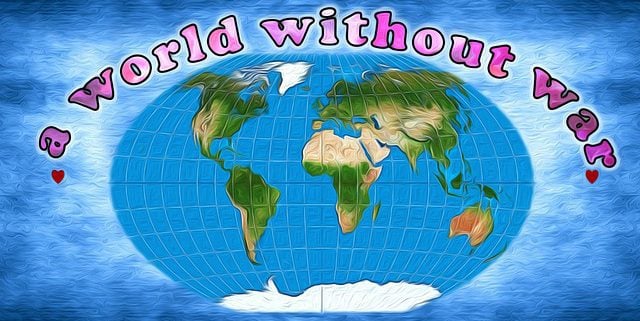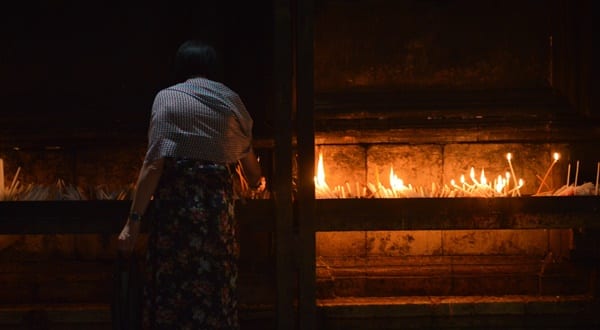 Twice in less than 24 hours I’ve been told that there is little we can do about our state of permanent war. I was told this by people I respect and who I know, in their own ways, are working toward goals of reducing suffering and making the world a kinder place. In each case, there was a context to their words. Though the contexts were different, the essential message from each of these people was that we need to focus on the things that we can change, the things that are within our grasp.
Twice in less than 24 hours I’ve been told that there is little we can do about our state of permanent war. I was told this by people I respect and who I know, in their own ways, are working toward goals of reducing suffering and making the world a kinder place. In each case, there was a context to their words. Though the contexts were different, the essential message from each of these people was that we need to focus on the things that we can change, the things that are within our grasp.
I respect that logic. And I know that ending war is a monumental goal that seems out of reach.
But.
I refuse to accept that permanent war is inevitable.
Peace is possible. Peace is essential. And we can make peace happen.
It is crucial to understand that permanent war undermines every other noble goal we could possibly hope to achieve, and therefore we can’t just accept it as inevitable while we focus on other issues. Other issues need attention, but our constant militarism — and the greed, dehumanization, and insecurity that it fuels which in turn feed it – is intertwined with all of these issues in ways to which we can long longer afford to be blind.
Anti-war activist David Swanson has repeatedly stated that the primary way war kills is by opportunity costs. The money funneled into our wars, preparations for wars, debt on wars, everything associated with killing to achieve our ends, could end world hunger, make medical advancements we can only dream of, shelter those who are now homeless, fund clean drinking water… the list could go on and on. Money that could go to education, the environment, infrastructure, community development, is instead funneled into weapons that destroy all of these things in addition to human lives. Any discussion about these issues so central to our lives that does not include the drain that war funding takes on them is woefully incomplete.
Furthermore, as we strive to resist racism, bigotry, misogyny, homophobia, and transphobia, we can never forget how constant war fuels fear, cruelty, and paranoia toward the “enemy other.” The simple facts that violence begets violence, that people who lose homes and families to bombs and drone strikes take up arms in vengeance, defense or desperation, and that blowback on our own land can be expected when we blow up lands far away, are just the most obvious ways that war fuels enmity. On a deeper psychological level, we must dehumanize in order to kill. Thus, drone strike victims are referred to as “bug splats” and other dehumanizing propaganda is used to justify continued killing. But the dehumanization of war is more intricate and subtle still. The drain war takes on our resources fuels economic insecurity that bubbles over in anger and fear and finds its targets in ready scapegoats – the marginalized in our society. While war is not the sole cause of marginalization, all the misplaced insecurity and disgust that manifests in the pathologies of racism, sexism, and homophobia are exacerbated by war. And any progress we could make in recognizing that we are one humanity and we need each other to face the challenges that await us as co-stewards of our dying planet is undermined by our insistence on our need to kill each other.
I am not suggesting that every conflict is easily resolved. I am suggesting we remove war from our toolbox and do the harder but infinitely more productive work of negotiating, compromising, sharing, curbing greed and vengeance, refusing to wall ourselves off from the humanity of one-another and daring to see our adversaries as people deserving of dignity.
The desire for peace burns in nearly every human heart. Yet, broadly speaking, there are two things hindering a massive peace movement. One is the glory we attribute to our own violence and our faith in its ultimate goodness. The other is doubt in the possibility of peace. Both can be attributed to our mimetic nature and our militaristic culture.
At the Raven ReView, we often explore how our misguided faith in our own violence is deeply embedded in our humanity. This human propensity toward violence is compounded by a jingoistic culture that glorifies our military and insists on our exceptionalism. It is hard to escape our human and our national faith in militarism, so we dedicate much of our writing to exposing the myth of violence. Yet enough people see the hopeless cycle of violence for what it is that I believe there would be a stronger peace movement if it weren’t for a defeatist doubt in its possibility.
I understand cynicism about the political will for peace in the face of a monstrous military industrial complex. But I believe that fatalistic resignation to endless war, which is literally killing our world, spreads like a contagion and becomes as big of an obstacle to peace as the war machine itself. We defeat ourselves when we give in to the narrative that violence is inevitable. But hope is contagious too. Faith in peace can spread if we nurture it. We must speak as if peace is possible, because that is the only way it will begin to be.
We have changed the narrative before. Abolishing slavery once seemed impossible. Women have been voting in the United States for less than a century, and segregation was the law of the land only 50 years ago. Marriage equality is now legal across the country, and a movement for universal healthcare, so recently dismissed as a fantasy, is currently underway. We have a long way to go, but we have made significant progress toward goals that have once seemed unattainable. We cannot eliminate conflict, but we can – and must – learn how to resolve it without the scourge of war.
We must summon our resources, energy, and creativity to the goal of making peace, as an end in itself and also as a means to so many other goals for which we strive. We need people of faith, agnostics, and atheists, people called to churches and people called to political office, educators and scientists, artists and musicians. We need mass movements and we need intimate conversations. We need to look to the roots of our own violence, continually reorient ourselves toward peace, and teach our children nonviolent conflict resolution and peaceful role models. We need to nurture faith in human redemption. And we need to be honest about the toll war is taking everywhere, so that we no longer accept or glorify it. Above all, we must rehumanize those whom we have dehumanized through endless war, far away and on our own soil, reclaiming our own humanity in the process. Within our various fields, with our various gifts, we must harness ourselves toward transforming a culture of enmity to a culture of compassion. There is so much we can do.
Peacemaking is hard. Making meaningful progress toward a more just and equitable world without it is a good deal harder. And surviving endless war in the nuclear age will ultimately prove impossible. I have faith that we can come together to end our wars if we refuse to accept the fatalistic notion that endless war is inevitable. Peace is possible. And we must make it happen.
Image: DWilliams via Pixabay. Public Domain.
Stay in the loop! Like Teaching Nonviolent Atonement on Facebook!











